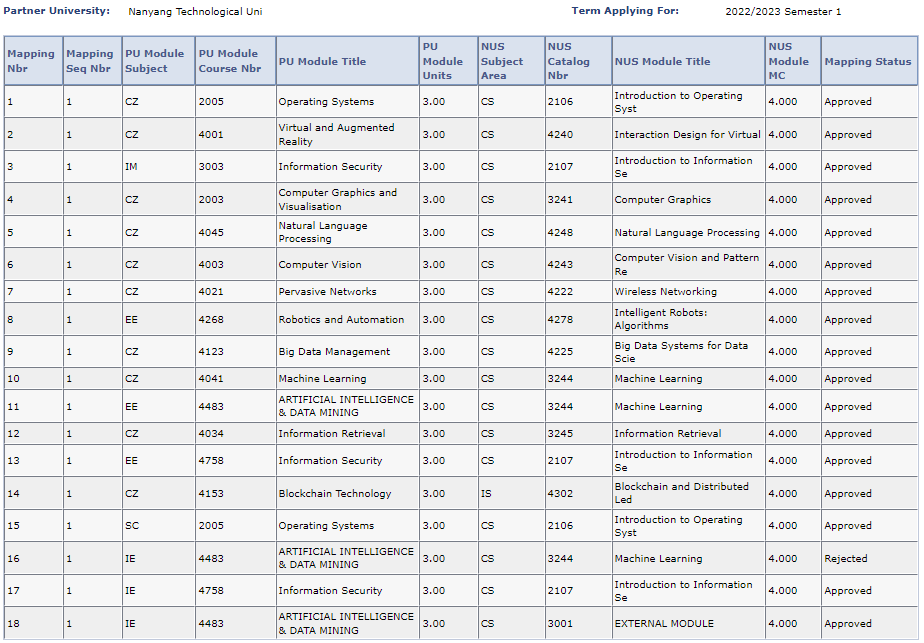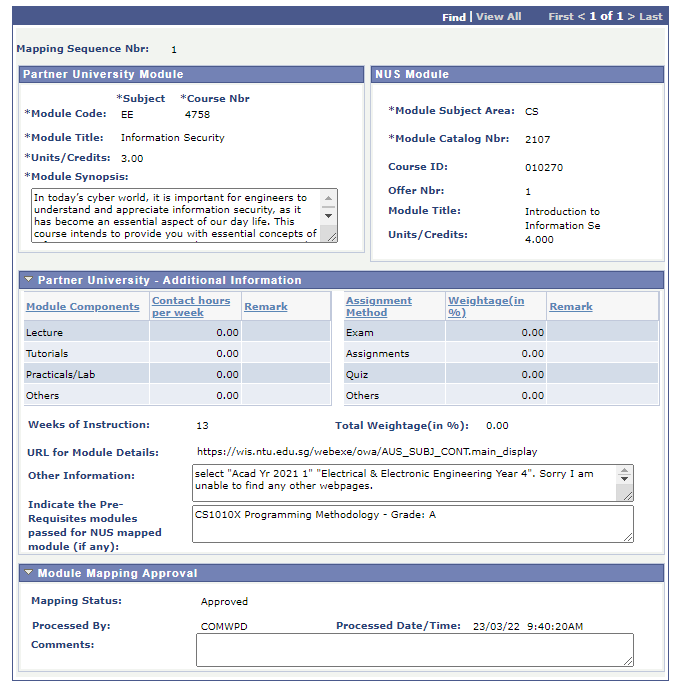End of University Year 3 Sem 1 (SUSEP)
Thoughts
For a variety of reasons, I decided to do a partial local exchange from the NUS school of computing (Computer Science) to NTU. Overall, I think the experience was good and refreshing to study in a (slightly) different environment. I ended up taking 1 module at NUS, and 5 modules at NTU. I will be writing a review of the modules below, and more importantly, I want to note down some of the gotchas that I encountered during the process of applying for the exchange. I hope that this will be useful to anyone who is considering doing a partial local exchange. Note that some of the information might be outdated, so please still do your own research.
Application
Singapore Universities Student Exchange Programme (SUSEP) is a program that allows students to take modules at another local university. The exchange is usually for a semester, and it is possible to do a partial exchange(meaning you can still do some modules at your home university). If you are interested, you should look out for the announcement email that will be sent out by the school nearer to the application period, which should be in the semester before the exchange. E.g. for my semester starting in August, the application period was in February. As they mentioned in the email, the quota is limited for NUS SOC so the application could be selective.
Application materials
Things required:
- submit an application form
- might require transcript
- will need a personal statement stating why you want to do the exchange
- an exchange plan indicating module mappings and the modules you want to take at the other university
I think a good personal statement could be important for the selection as there are only a few slots.
Module mapping
I would say that module mapping is a really troublesome part of the process. You need to do your own research to find out the modules offered and whether they could possibly be mapped back.
Some things to do include:
- going into Edurec and checking the past module mapping records, which could be found under academics -> global education -> search module mapping
- search online to see if the modules are still available and offered in the coming semester
Below is a list of approved modules that I requested, so you can use it as a reference. (open the image in a new tab if blurry)

Gotchas
Here's what I painfully learned during the process of module mapping:
- some modules might not be offered to exchange students.
- some modules may claim that they don't offer to exchange students but somehow you can bid and get the module ...
- some modules may be phased out.
- some modules have separate module codes for a particular faculty, e.g. CZ XXXX for computer science students.
- module code and content could change from year to year, which means the module mapping may become invalid if it differs from what you requested
- when filling up the individual module request, you will need to provide module information as well as your pre-requisite module grades. Sometimes it's impossible to find a URL for module details, in those cases you can try to print out the NTU official module search webpage and upload it to dropbox, and then link it. If you can't find the module details e.g the module components, you can just leave it blank (which was what I did).
- if you are doing a partial exchange, do take note that you may need to submit appeals to NUS to adjust your min workload. This is to prevent the system from disallowing you to drop the extra modules you applied to at your home university. I applied for additional modules at NUS just in case I could not secure the modules that I wanted at NTU, and I had a hard time dropping them after I got the modules I wanted at NTU.
- Some modules will be preallocated to you before the exchange period, and for the rest, you will have to go through the module bidding process.
- If you are doing a partial exchange, you will need to be careful about schedule conflicts. Even if the modules don't directly conflict, you may need to take into account the time you need to travel between the two universities. I would say for some of the modules in NTU, it was fine that I did not attend the tutorials and lectures as I could just watch the recordings or read the slides. However, for some modules, there are compulsory labs or you need to be careful with the quiz timings that happen during lecture time.
Below is a sample module mapping request that you will need to fill up. (open the image in a new tab if blurry)

CS3219 Software Engineering Principles and Patterns (NUS)
This is an over-subscribed software engineering module that many students want to do. It was worth doing because I got to try and understand not just some of the software principles, but also technologies that support them. A large part of what I learned came from working on individual assignments, which got me into Docker, Kubernetes, Redis, AWS hosting and deployment, kafka, and more. Those experiences were really valuable as I wanted to learn about these technologies for a long time and finally had the chance to do so. The group assignment was also a good way to practice building an application powered by micro-services. Overall, I would say that the practical aspects of the module were really good. Of course, what you learn out of it depends on how much effort you put in, but I would say that the assignments were well structured for you to learn.
One thing that I remembered: my first time implementing a complete authentication system via JWT......pretty cool experience as I discovered some intricacies of JWT and how to use it properly. (I will probably write about it in the future)
SC2005 Operating Systems (NTU)
I took this module to map it back to our NUS core OS module, and surprisingly the quality of this module in NTU was pretty decent. I think that the two profs delivered the course well (lectures were great) and the tutorial was conducted in a way that was very helpful for students to understand the concepts (again, the prof for my tutorial was great). The labs were a little less challenging and the workload overall was very manageable.
CZ4003 Computer Vision (NTU)
This module is an overview of the computer vision space, talking about how digital images can be enhanced, and how computers "see" them (so edge detection, object detection, 3D reconstruction etc). I think it gave me some ideas about what computer vision means and the mechanisms behind things like object detection. My personal opinion is that the module materials were not very easy to understand and perhaps some background knowledge was required in order to understand the concepts better. When going into the technical details such as deriving Fourier transforms, some mathematical maturity certainly helps for topics on linear algebra, calculus, trigonometry, and matrix manipulation. Overall, I think I would not recommend this module.
IE4483 Artificial Intelligence and Data Mining (NTU)
This module is split into 3 parts:
- traditional AI methods(e.g. search, logic, planning, etc)
- Machine learning (convolutional neural networks, decision trees, etc)
- Data mining and more ML (clustering, optimization, PCA etc)
The last two parts were well taught and the topics covered gave me a good introduction to machine learning. The first part was a little less interesting, probably because I already learned those in the introduction to AI in NUS. The assignments were doable. Overall I would say that this module is worth doing if you want to learn more about machine learning.
IE4758 Information Security (NTU)
I think this module is super light and the workload is almost non-existent. The module is about the basics of information security, and the topics covered are pretty much common sense. It's like a general knowledge class where you just come in and listen to the prof talk about the topics. The only technical parts are some calculations that you need to do for cryptography(e.g RSA and Diffie-Hellman key exchange), which is not difficult. Overall this module is pretty simple and recommended if you want to do a near-zero workload module.
CX4153 Blockchain Technology (NTU)
The lectures in this module are all recorded and every week you will need to watch a series of videos. After doing this module, I finally understood some of the concepts in the blockchain world. I think the topics are interesting and I got the fundamental ideas of blockchain after doing this module. And I appreciate why blockchain is so popular because it solves some of the existing problems with such an elegant computational and distributed solution. The assignment also gave me a good idea of how to write a smart contract and connect it to a frontend. Overall, I would say that this module is highly recommended if you are interested in blockchain.